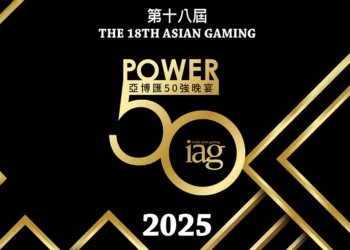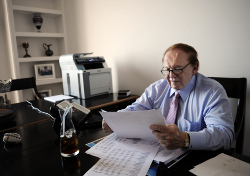 1 (2) Sheldon Adelson
1 (2) Sheldon Adelson
Chairman and CEO
Las Vegas Sands Corp
Sheldon Adelson was never likely to take up a career in international diplomacy. His fans describe him as tenacious. His detractors describe him as difficult. Chances are he’s not too worried either way. He got where he is today by force of will and personality, not by hanging on the views of other people.
A challenge in Asia is that when the unstoppable force of Mr Adelson’s personality comes up against the immovable object of Chinese business and political etiquette, the outcome is likely to be stalemate. That’s exactly where Las Vegas Sands Corp seems to be in its dealings with the Macau government at the moment.
An interesting question is whether Mr Adelson could have been making even more money out of his Macau operation if he had handled his relations with the government differently. Chances are, probably not.
While most of his competitors have been chasing the high volume, low margin VIP baccarat trade in Macau, Mr Adelson has been going especially hard after the higher margin mass market business, while seeking to build up his VIP business in the lower tax, higher margin jurisdiction of Singapore, where the company opened its Marina Bay Sands integrated resort in April.
Of all the Macau operators, Mr Adelson is best equipped to attack the mass market segment there. Sands Macao was designed as predominantly a mass property. That was revolutionary for the jurisdiction when the casino opened back in May 2004. And The Venetian Macao is virtually a love letter to mass market entertainment, though it also has significant VIP capacity, including the Paiza Club and at The Plaza casino in The Four Seasons Macao extension next door.
In August, LVS’s Macau unit, Sands China, announced net profit for the first half of 2010 was up more than 300% from the equivalent period a year earlier. Sands China, which listed in Hong Kong in November 2009, made US$250.5 million net profit—up from US$58.3 million in the first half of 2009. Revenue rose 32% to US$1.98 billion from US$1.50 billion.
So far so good. The challenge is in sustaining the growth of that Macau performance. The live baccarat trade in particular is likely to be constrained by a cap between now and the end of 2012 on the number of tables allowed in the city. The company’s Macau growth will depend, therefore, on how quickly it can open its US$4.2 billion Cotai 5 and 6 extension and how effectively it can stock the gaming floors—possibly with as many as 100 electronic table games. Building 5 and 6 in turn depends on how successful Sands China is in negotiating the minefield of Macau’s labour shortage. This process may be easier if Sands China can re-set the sometimes difficult relationship it has had with the Macau government. That was probably why Michael Leven, Sands China’s acting Chief Executive (following the dismissal of Steve Jacobs in July), said he was interested in hiring an ‘Asian’ as a replacement.
A Chinese or other Asian face at the top of Sands China won’t, however, be an instant fix in that process of rapprochement. At the end of August, Mr Adelson openly stated what a number of industry analysts had been saying for weeks—that Cotai 5 and 6 would be delayed from its planned third quarter 2011 opening because of the labour issue.
LVS continued to be upbeat about the project though, saying that an opening in the fourth quarter of 2011 is still achievable. That may be still optimistic, given the Macau government’s insistence on a ‘one for one’ policy (i.e. one local construction worker hired for every non-local brought on site) and the absence of any formal training system to convert local workers from other sectors into construction tradespeople.
The only option available to LVS and its local unit Sands China, therefore, may be to throw money at the problem and offer wages that are so attractive that locals are tempted to switch from jobs in other sectors. An added complication is that if the usual protocols of project management are followed, most of the hiring will be done not directly by Sands China, but via contractors and sub-contractors. This means potentially that any financial incentives to encourage recruitment may have to come out of the contractors’ end, not out of Sands China’s end. Untangling those issues could make a challenging situation even more difficult.
The mood music appears very different in LVS’s dealings with the Singapore authorities. At the initial opening of Marina Bay Sands (MBS) in April, Mr Adelson was fulsome in his praise for the Lion City, even suggesting at one point that he and his wife would be interested in moving there—an interesting counterpoint to Steve Wynn’s stated idea of moving his main corporate office from Las Vegas to Macau.
MBS generated US$94.5 million of adjusted property EBITDA (earnings before interest, taxation, depreciation and amortisation) on an EBITDA margin of 43.7% in the stub quarter from 27th April to 30th June. Net revenues for the period were US$216.4 million. Given that during this period the shopping mall and the hotel were not fully open, Mr Adelson’s assertion that MBS can generate US$1 billion in annual EBITDAR looks achievable. LVS’s earnings from Asia enabled it to announce, in late August, plans to pay down US$1 billion of its global debt.
In less than 24 months, LVS has gone from corporate basket case facing a real threat of extinction to cash machine. Mr Adelson would probably contend that the downside on his business was always overstated, given the powerful economic growth of China and the region. The fact that LVS is the only casino operator to have successful resorts in both of Asia’s key markets—Macau and Singapore—is the decisive factor in Mr Adelson making top spot in the Asian Gaming 50 list for 2010.
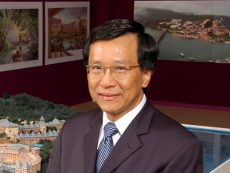 2 (1) Lim Kok Thay
2 (1) Lim Kok Thay
Chairman and CEO
Genting Berhard
Genting’s Lim Kok Thay has presided over a momentous year in the history of the company. The Malaysia-based conglomerate that has interests covering most major sectors, including palm oil plantations and power generation as well as casino gaming, opened the first integrated gaming resort in neighbouring Singapore on St Valentine’s Day. Of greater significance is the fact the date coincided with Chinese New Year.
In its second quarter results—the first full quarter since the US$4.4 billion Resorts World Sentosa (RWS) opened—the casino’s operational unit, Genting Singapore (GENS), reported gross revenue of S$979.3 million.
That’s equivalent to daily gross revenues of S$10.8 million (US$8.1 million) per day. Even discounting the earnings of GENS’ UK casinos from the balance sheet, it means RWS generated considerably more than the US$5.3 million gross per day recorded in the stub first quarter. Revenue from the S$527.1 million sale of the UK casinos to Genting Malaysia will appear in the second half results. Reuters said in late August the sale provoked a ‘shareholder revolt’ at the latter company, with 38% of shareholders voting against it—though the deal was eventually endorsed. Such an open display of shareholder disapproval was a very rare event in the history of Malaysian public companies, added Reuters.
Questions have also been raised about the prospects for RWS’s medium to long term profitability, given that it seems to be operating on slim margins in the VIP segment, with reports of rebated commissions on rolling chips paid to VIP players going as high as 1.7%.
Other outstanding issues also serve to put something of a cloud on Genting’s horizon. Universal Studios Singapore, the theme park that was supposed to cement the mass tourism appeal of RWS, is not yet fully operational. There are political concerns about the long term viability of Genting Malaysia’s gaming licence in Genting Highlands if Islamists unsympathetic to the casino industry gain more say and more visibility in the Malaysian governmental system. Genting Highlands has been on a rolling three-month licence ever since it opened back in the 1960s.
Genting’s investment at Resorts World Manila in the Philippines is also under some scrutiny following the election of a new government in that country. The incoming administration is at best lukewarm about the existence of casino gaming in the country and has placed a moratorium on further expansion of land based operations within the country. The recent hijacking in Manila of a tour bus full of Hong Kong tourists and the subsequent botched rescue operation that led to eight of them being killed in the gun battle can hardly have done much to improve the prospects of Resorts World Manila attracting more Chinese visitors.
As a sign of Genting’s sensitivity to the need to maintain positive sentiment on the equity markets, in late August Genting Malaysia announced it had bought back a total of 11.2 million shares at an average price of RM3.03. This brings its cumulative treasury shares held at 3.71%. The group has also announced its intention to purchase up to a further 376 million shares (representing 6.4% of share capitalisation) within the next 10 months.
For all the above reasons Mr Lim loses his top spot on this year’s Asian Gaming 50 list. On the upside, however, in the last 12 months Genting underwent a structural reorganisation that should help to create more transparency for shareholders and analysts seeking to assess the prospects of this sprawling business empire and, if necessary, separate the gaming components from the non-gaming ones.
The reorganisation involved the creation of specific jurisdictional units to run its gaming operations in different countries. Genting Singapore (GENS) is the local unit running RWS. Genting Malaysia does the job for Genting Highlands and Genting Hong Kong is the new name for the former Star Cruises, the company that operates casino cruise ships out of Hong Kong and has invested as a joint venture partner in Resorts World Manila, a casino and hotel complex next door to Manila International Airport.
There is also talk of Genting Singapore launching a new share issue to complement the initial public offering on the Singapore bourse in September last year. That raised S$1.63 billion (US$1.14 billion). The reports of a new share offer should be taken seriously, given that they emanated from CIMB Singapore, a company that acted as joint financial adviser and joint lead managers for GENS’ first rights issue.
Genting’s Lim Kok Thay has presided over a momentous year in the history of the company. The Malaysia-based conglomerate that has interests covering most major sectors, including palm oil plantations and power generation as well as casino gaming, opened the first integrated gaming resort in neighbouring Singapore on St Valentine’s Day. Of greater significance is the fact the date coincided with Chinese New Year.
In its second quarter results—the first full quarter since the US$4.4 billion Resorts World Sentosa (RWS) opened—the casino’s operational unit, Genting Singapore (GENS), reported gross revenue of S$979.3 million.
That’s equivalent to daily gross revenues of S$10.8 million (US$8.1 million) per day. Even discounting the earnings of GENS’ UK casinos from the balance sheet, it means RWS generated considerably more than the US$5.3 million gross per day recorded in the stub first quarter. Revenue from the S$527.1 million sale of the UK casinos to Genting Malaysia will appear in the second half results. Reuters said in late August the sale provoked a ‘shareholder revolt’ at the latter company, with 38% of shareholders voting against it—though the deal was eventually endorsed. Such an open display of shareholder disapproval was a very rare event in the history of Malaysian public companies, added Reuters.
Questions have also been raised about the prospects for RWS’s medium to long term profitability, given that it seems to be operating on slim margins in the VIP segment, with reports of rebated commissions on rolling chips paid to VIP players going as high as 1.7%.
Other outstanding issues also serve to put something of a cloud on Genting’s horizon. Universal Studios Singapore, the theme park that was supposed to cement the mass tourism appeal of RWS, is not yet fully operational. There are political concerns about the long term viability of Genting Malaysia’s gaming licence in Genting Highlands if Islamists unsympathetic to the casino industry gain more say and more visibility in the Malaysian governmental system. Genting Highlands has been on a rolling three-month licence ever since it opened back in the 1960s.
Genting’s investment at Resorts World Manila in the Philippines is also under some scrutiny following the election of a new government in that country. The incoming administration is at best lukewarm about the existence of casino gaming in the country and has placed a moratorium on further expansion of land based operations within the country. The recent hijacking in Manila of a tour bus full of Hong Kong tourists and the subsequent botched rescue operation that led to eight of them being killed in the gun battle can hardly have done much to improve the prospects of Resorts World Manila attracting more Chinese visitors.
As a sign of Genting’s sensitivity to the need to maintain positive sentiment on the equity markets, in late August Genting Malaysia announced it had bought back a total of 11.2 million shares at an average price of RM3.03. This brings its cumulative treasury shares held at 3.71%. The group has also announced its intention to purchase up to a further 376 million shares (representing 6.4% of share capitalisation) within the next 10 months.
For all the above reasons Mr Lim loses his top spot on this year’s Asian Gaming 50 list. On the upside, however, in the last 12 months Genting underwent a structural reorganisation that should help to create more transparency for shareholders and analysts seeking to assess the prospects of this sprawling business empire and, if necessary, separate the gaming components from the non-gaming ones.
The reorganisation involved the creation of specific jurisdictional units to run its gaming operations in different countries. Genting Singapore (GENS) is the local unit running RWS. Genting Malaysia does the job for Genting Highlands and Genting Hong Kong is the new name for the former Star Cruises, the company that operates casino cruise ships out of Hong Kong and has invested as a joint venture partner in Resorts World Manila, a casino and hotel complex next door to Manila International Airport.
There is also talk of Genting Singapore launching a new share issue to complement the initial public offering on the Singapore bourse in September last year. That raised S$1.63 billion (US$1.14 billion). The reports of a new share offer should be taken seriously, given that they emanated from CIMB Singapore, a company that acted as joint financial adviser and joint lead managers for GENS’ first rights issue.
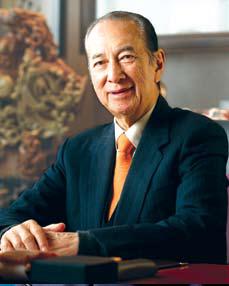 3 (3) Stanley Ho
3 (3) Stanley Ho
Chairman and Managing Director
Sociedade de Jogos de Macau (SJM)
Dr Stanley Ho is a survivor in business and in life. But at 88 years of age, his hospital stay during the final five months of last year— after being taken ill at home—has thrown into focus the leadership succession issue at his casino operating company, Sociedade de Jogos de Macau (SJM), and his investment holding company, Sociedade de Turismo e Diversões de Macau (STDM).
SJM amounts to more than just one man. In Dr Ambrose So, SJM’s Chief Executive, Dr Ho has a very able lieutenant with a strong grasp of strategic issues in the Macau gaming market. But Dr So is not family, and family still counts for a lot in Chinese culture in general and Chinese business culture in particular— despite the fact that SJM is now a listed company with some of its stock publicly held and traded.
Inside Asian Gaming won’t take up too many more column inches here repeating the speculation and possible succession scenarios for SJM. The wider point to consider is how much of SJM’s market strengths and political capital, both with the Macau government and the central government in Beijing, depends on Dr Ho’s personal connections, and how much of the political capital is due to tradition and the SJM ‘brand’ and can survive without him.
Any institutional investors will not want the succession question left to chance. They will want indications of some sense of process and formula applied to it, rather than waiting for smoke to emerge from an SJM corporate office ‘chimney’ in the manner of a new pope being elected by cardinals meeting in the Vatican.
There is some debate about exactly how much of SJM’s stock is held by Ho family interests or associates. There were reports at the time of SJM’s initial public offering in Hong Kong during July 2008 that a significant portion of the offered stock had actually been purchased by the family in small parcels. Under local stock exchange rules, any individual or entity holding a block of less than 5% of publicly issued share capital does not have to be publicly identified. But even if it’s the case that family interests are holding much of the issued stock, it doesn’t help much in understanding the dynamics of the business, given that the Ho family is divided into many competing factions. It’s difficult to predict, therefore, how shareholders would vote if there were to be a fight over the SJM succession. Litigation via the Hong Kong courts could potentially be one way for institutional shareholders to exert some influence, but it is expensive and by no means guaranteed to succeed. This was seen when Winnie Ho, one of Dr Ho’s sisters and a minority shareholder in Dr Ho’s investment holding company STDM, filed a lawsuit over the flotation of SJM. In any case, opacity has served Ho family businesses well in the past in dealings with what some Western regulators have described as organised crime elements historically linked to Macau junket operations. Why change the habit of nearly five decades?
Unlike most public companies in the West, there are no SJM corporate statutes indicating publicly the protocols for succession. Many assume that the two main candidates are Pansy Ho and Lawrence Ho, because of their experience in running joint venture gaming projects with Western partners in Macau. Ms Ho was certainly being treated like the anointed successor by a procession of would be ‘courtiers’ at a recent society party in Macau. But that could have been as much about the locals being polite (and hedging their bets) as about having any supposed inside knowledge.
There is certainly plenty to be gained from calling the succession issue correctly, and, by implication, plenty to be lost by calling it incorrectly. That’s both in terms of short term profits or losses on SJM shares, and in terms of understanding the company’s future strategy.
SJM announced its interim results on 30th August, with profit in the first half of 2010 more than quadrupling from the same period a year ago to HK$1.57 billion (US$202 million). The profit spike was largely driven by soaring revenue from high rollers—SJM said its VIP baccarat revenue rose by more than 111% in the first half, outstripping the average Macau VIP market growth of 85% during the period. The company’s total revenue rose 79% to HK$26.72 billion in the first half.
Analysts point out that while SJM remains Macau’s market share leader thanks to its continuing grip on the VIP market (which remains geographically concentrated on the Macau peninsula), in order to safeguard its long-term position, the company needs to come up with a more detailed development plan, including expansion into Cotai.
SJM currently has no properties operating on Cotai, and though it does own two plots of land there, they do not occupy prime positions. The company has since expressed an interest in acquiring either the Macao Studio City site, which has sat idle for over three years while its investors remain locked in dispute, or Sands China’s sites 7 and 8.
SJM is in an unparalleled financial position among Macau casino operators to purchase and develop any prime plot that becomes available on Cotai—it is on track to have accumulated close to US$2 billion in cash reserves by the end of this year. If the company succeeds in courting the mass market on Cotai, Stanley Ho’s legacy will be having endowed it with the resources to leverage any market opportunity that presents itself in Macau.
 4 (4) Steve Wynn
4 (4) Steve Wynn
Chairman and CEO
Wynn Resorts
The opening of Wynn Cotai can’t come soon enough for Steve Wynn. After four years of Wynn Macau punching well above its weight in the Macau market (relative to the US$1.2 billion capital initially invested and the modest footprint of the gaming, shopping and hotel facilities), there are signs at least among the VIP agents and their players that the wow factor may be wearing off a little.
The counter to that argument is that China is a big place, and there are plenty more visitors who have yet to sample Wynn Macau’s delights. The counter to that counter argument is that the lifeblood of all the territory’s casinos is the high roller players—and they are generally directed to the Macau casinos that offer the junkets most support. On occasion, that can even trump the importance of rolling chip commission levels.
In terms of infrastructure and service, Wynn Macau was undoubtedly a standardsetter in Macau. The care with which it was conceived and the way the project was executed and managed are evidence of that. But rival operators are beginning to catch up. The market pretenders may not yet all have the six-star service that Wynn Macau proudly boasts of, but they are hungry for success. Those rivals also have boards and institutional investors breathing down their necks, which has a tendency to concentrate minds rather wonderfully.
An example is the way that neighbouring MGM Macau, an underperformer in the VIP baccarat segment since it opened in December 2007, is going very hard after some of the same VIP business as Wynn Macau. Reports suggest MGM has scored some recent success at Wynn’s expense. Whether MGM can maintain that success is another matter.
One of Wynn Macau’s virtues when it opened in September 2006 was that high quality had been firmly concentrated in a relatively small piece of real estate. The US$600 million Encore at Wynn Macau extension to the property that opened in April this year was designed to provide extra capacity for the cream of high rollers in that rapidly expanding segment and to excite the palates of existing VIP players interested in a change of surroundings.
But for all the undoubted quality and club-like feel of Encore at Wynn Macau, its success may ultimately depend on how good the company is at persuading junkets to stock it with players.
The direct premium play route—where credit is issued direct to the player by the casino—is in theory the preferred route of the Las Vegas operators, because it ought to provide better margins than working via agents. In practice, because the agents and sub agents are in fierce competition with each other and with the casinos for VIP roll, they are willing on occasions to cut their margins to almost nothing to retain VIP business. And with around 70% of Macau’s VIP players coming from mainland China, and courts in the People’s Republic not recognising gambling debts, the direct premium route is a culturally demanding as well as high risk enterprise. To retain the love of the junkets, and therefore to keep bringing in VIP players, Mr Wynn may need to think about sharing some more of his profits with them. If he doesn’t do it, his rivals might.
Mr Wynn’s suggestion that he may move his corporate headquarters to Macau (he says he currently commutes to the city at least once a month) may speak precisely to the point about the need for Wynn Resorts to refocus its Macau strategy. The opening of Wynn Cotai is a clear opportunity to do that. It will be resolutely upscale, says Mr Wynn, despite its location in mass-market Cotai. Unlike the cramped Macau peninsula, Cotai offers sufficient space to allow Mr Wynn to build on a Las Vegas Strip scale, giving more Chinese people more reasons to sample the Wynn experience. But Wynn Cotai is unlikely to open until 2014 at the earliest.
Short of buying someone else’s Macau casino and refitting it—an approach to business expansion that Mr Wynn hasn’t tried in Las Vegas for decades—he will have to wait for organic company growth via Wynn Cotai to broaden his coverage in Macau. Fans of Wynn Resorts must be patient and keep the faith until then.
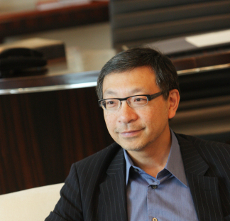 5 (6) Francis Lui
5 (6) Francis Lui
Deputy Chairman
Galaxy Entertainment Group
In last year’s list we said time would be the judge of whether Francis Lui was right to delay opening Galaxy Macau from its original deadline of the third quarter of 2009. That assumes the decision by Galaxy Entertainment Group (GEG) to delay was one of choice rather than necessity, and that it could have bridged a gap in funding for the Cotai resort if it had been prepared in early 2009 to pay silly money or sign onerous covenants in return for bank loans. If the delay was an exercise in choice, then the HK$9 billion syndicated loan for completion of Galaxy Macau it signed off in April 2010 (priced at 4.5% above Hong Kong interbank offered rates) looks like reasonably shrewd business.
On the down side, the delay does mean Galaxy Macau missed out on the rip roaring VIP baccarat growth of 2010. It also means the project got caught up in the politics of the Macau government’s cap on live gaming tables, announced in March. As a result, Galaxy Macau will open in the first half of 2011 with at best two-thirds of the 600 live gaming tables the resort was slated to have. Tarrying also meant the scheme became bogged down in Macau’s labour politics.
In July, Macau lost patience with the way Galaxy was implementing the government’s ‘one for one’ hiring policy on construction workers Macau announced in May (i.e. one local building worker for every migrant worker signed up). The government told the company it could not bring in all the migrant building labour it had asked for to complete the site until it increased the number of local workers. This is a real problem because Macau’s unemployment rate was only 3.7% in the second quarter. Mr Lui told Macau journalists at a company event in late August that the labour squeeze had “slightly affected” the project and put it behind schedule.
Even if Galaxy resolves the construction labour issue and finishes the project by the end of the first quarter of 2011 as promised, the company still faces significant challenges in hiring enough locals for day to day gaming and hotel operations. Unless it does hire plenty of locals at the opening phase of operations, it will be difficult politically for Galaxy to get a generous allocation of migrant worker permits for management and hotel staff positions.
In an effort to reassure investors and to ensure Galaxy Macau doesn’t miss out on the current bullish mood among Macau visitors, Galaxy said at the end of August it would spend an extra HK$800 million to open a larger proportion of rooms at the resort’s first phase launch than it had originally planned. The number of rooms available at the Galaxy Macau launch will rise by more than 50% to 1,400 from the originally planned 900 rooms as it aims to exploit the fact that there will be no other new casino openings in Macau until the end of 2011 at the very earliest.
The news about extra upfront investment in Galaxy Macau without major new debt implications is the sort of surprise investors like. For that reason, Galaxy has proven a useful pick for investors who want to go long in Macau and who value fiscal caution.
In the six months to end of June, Galaxy made net profit of HK$608 million (US$78.14 million), up from HK$240 million a year earlier. Revenue rose 61% to HK$8.57 billion from HK$5.33 billion.
The positive half-year results continued the trend of 2009, when Galaxy first reported it had swung into profit. In April this year, GEG, founded by Mr Lui’s father, Dr Lui Che Woo, announced net profit for the 12 months ended 31st December 2009 of HK$1.15 billion (US$150 million). That reversed an HK$11.39 billion net loss a year earlier. The loss in the first half of 2008 had been principally due to a HK$7 billion (US$900 million) write down in the value of its casino licence in Macau. That write down effectively meant GEG was forgiven debt owed to Dr Lui. The company had done a deal in 2005 to pay him HK$18.4 billion (US$2.37 billion) for the gaming permit. The Lui family acquired the licence for free from the Macau government in February 2002, as part of a now defunct joint-venture bidding consortium with Las Vegas Sands Corp.
The fact the write down made Dr Lui’s personal worth on paper take a dip was considered by the family and the Galaxy board a price worth paying. At a stroke, the write down significantly reduced GEG’s debt burden. That, combined with the cash generated by StarWorld Hotel & Casino— the company’s property on the Macau peninsula—played an important role in improving the sentiment of those investors sticking with Galaxy for the long haul. Because of such caution and Galaxy Macau’s positioning as a genuine integrated resort focused on the higher margin mass market, Mr Lui moves up one place this year to number five on the Asian Gaming 50 list.
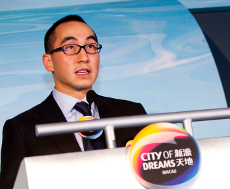 6 (5) Lawrence Ho
6 (5) Lawrence Ho
Co-Chairman and CEO
Melco Crown Entertainment
Lawrence Ho is something of an enigma, despite being one of Macau’s leading gaming entrepreneurs. He seems less assured in public speaking than his half sister Pansy, rarely making unscripted remarks and only occasionally taking ad hoc questions from journalists at press conferences.
That’s not to say Mr Ho is incapable of effective leadership. He has displayed evidence of the ruthless streak necessary in business by overseeing the operational management shake up this summer at his joint venture casino operating company, Melco Crown Entertainment (Nasdaq: MPEL). In came Mr Ho’s protégé, the local Chinese executive Ted Chan, to take a position titled Co-COO of Gaming at City of Dreams (CoD), the company’s flagship gaming resort on Cotai. Out went Westerner Greg Hawkins, the President of CoD, followed soon after by Simon Dewhurst, the Chief Financial Officer of MPEL.
Mr Chan was first talent spotted by Mr Ho when he was appointed to run what was originally the purely Melco-owned Mocha Clubs, a chain of locals-focused slot parlours mainly located in suburban areas of Macau. Mocha is now part of MPEL.
The departure of Messrs Hawkins and Dewhurst—two appointments from the Crown side of the MPEL joint venture—and the introduction of junket marketing more in the style and manner of Dr Stanley Ho’s casino operating company, Sociedade de Jogos de Macau (SJM), on the gaming floors at CoD suggests the operational management of MPEL is becoming ever more localised. That might be considered no bad thing by investors, given that the MPEL properties are overwhelmingly serving Chinese customers and CoD has been somewhat laggardly in tracking the general growth of the high roller market in Macau this year.
Wynn and Las Vegas Sands Corp have also worked with junket operators traditionally linked with Dr Stanley Ho, so the recent changes at MPEL should not be overstated. The fact that Mr Ho is related by blood to Dr Ho inevitably leads to speculation, however, that closeness to SJM partners equals cosying up to SJM itself. This may be a wrong assumption, but ‘guilt by association’ is a familiar experience for the Ho family, as witnessed in the findings by New Jersey state investigators against Pansy Ho.
Given the deep roots of STDM and SJM in the Macau gaming market, the concern in some quarters is that joint ventures such as MPEL could morph into fronts for Ho family interests. It is worth noting that James Packer, head of Crown Casinos and MPEL’s other Co-Chairman, didn’t even attend the first anniversary celebrations for CoD in June. If Western money is merely seed capital to support the establishment of new gaming operations later fashioned in the image of STDM/SJM, then what was the point in regulatory and consumer choice terms of introducing ‘competition’ to the Macau market in the first place? That’s the thinking of some sceptics.
That sentiment takes on greater significance given that Lawrence Ho’s name has inevitably been mentioned in relation to the issue of leadership succession at SJM following the five-month hospital stay by 88-year-old Dr Ho late last year.
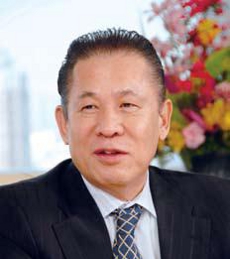 7 (7) Kazuo Okada
7 (7) Kazuo Okada
Chairman
Aruze Corp
Vice-Chairman
Wynn Resorts
Aruze Corp has had an exciting year with the emergence of its slot and multiplayer casino products as major competitors on the world market. Games such as Lucky Sic Bo and Rock You Queen from its equipment subsidiary, Aruze America, have taken the Macau market by storm. Lucky Sic Bo was overwhelmingly voted ‘Best Multiplayer’ by industry executives in Inside Asian Gaming’s Supplier Awards 2010.
Mr Okada built his fortune on Aruze’s success in the Japanese pachinko and pachislot machine manufacturing markets. The gaming machines using steel balls are one of Japan’s most popular forms of entertainment and Aruze is the second largest manufacturer of them. Over the years, Aruze (formerly Universal Distributing) expanded into the production of other electronic gaming machines, amusement machines and video games.
Mr Okada is also a major shareholder in Wynn Resorts. The opening in April of Encore at Wynn Macau, the VIP focused extension to Wynn Macau, and the announcement in June that Wynn is planning a second Macau property—this time on Cotai—is likely to further improve his fortunes and those of his gaming businesses.
Steve Wynn’s relationship with Mr Okada began in 2000 when the former was looking for new financial backers to open Wynn Las Vegas. Mr Okada answered his call with a substantial investment that netted Aruze the single largest stake in Wynn Resorts— currently standing at 21.8%. The up-ward trend in Wynn’s stock price contributed to Mr Okada regaining the mantle of self-made billionaire—with an estimated net worth of US$1 billion in 2010, compared to US$900 million last year, according to Forbes’ Japan’s Richest list. Mr Okada ranks in 26th place on that list at the youthful (by Japanese billionaire standards) age of 67.
Mr Okada’s alliance with Mr Wynn could bring new benefits for both men if Japan ever legalises casino gaming. More problematic for Mr Okada are his investments in the Philippines. The company has already located its regional manufacturing operation there and is set to make a major spending commitment by building a casino resort at Manila Bay. Behind the scenes, Mr Okada will want assurances that his planned casino venture will actually be welcomed by the country’s political leadership. The new president, Benigno Aquino, seems at best lukewarm about the existence of land based casino gaming and has placed a moratorium on further expansion of land based operations within the country.
Recent reports from the Philippines suggest the new government will honour a so-called ‘midnight deal’ between Aruze and the previous administration allowing Aruze title to the land on which the casino resort is to be built. This is a clear reversal of normal Philippines policy on overseas investment. It was seen at the time as an attempt by Dr Efraim Genuino, who until May was chairman of the Philippine Amusement and Gaming Corporation (Pagcor), to seal the Aruze resort deal and secure his legacy as the man who transformed the local casino industry by bringing in internationally recognised partners.
It’s nearly two years now since Aruze put down a hefty US$100 million in an escrow account for the project. The negotiations have been protracted because the Japanese fretted that without ownership of the land, they would have no security over their investment.
The recent hijacking in Manila of a tour bus full of Hong Kong tourists and the subsequent botched rescue operation that led to eight of them being killed in the gun battle can hardly have done much to improve the prospects of Philippines gaming resorts attracting Chinese tourists.
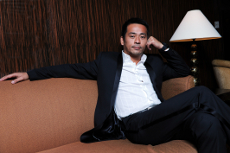 8 (-) Alvin Chau
8 (-) Alvin Chau
Chairman
Sun City Group
Having vision isn’t sufficient to make you a visionary. In addition to recognising unrealised market potential, you also need the ability and resolve to turn that potential into a viable business.
Others had previously tried to develop poker’s following among Chinese players in baccarat-focused Macau, but until Suncity Group’s Alvin Chau stepped in, that mission seemed a distant dream. Now, Chinese high rollers at Suncity’s Poker King Club— unveiled at StarWorld Casino on October 31st last year—play for the biggest pots in the world.
To support the Poker King Club marketing effort, Suncity bankrolled the star-studded Hong Kong film ‘Poker King’ (part of which was shot at StarWorld) and enlisted poker legend and ten-time World Series of Poker Champion Johnny Chan as its representative—Mr Chan was even on hand to give tutorial sessions in Texas Hold ‘em at the club during its first month of operation.
Of course, it helps that Mr Chau has the financial resources to back his vision. Although he only set up Suncity Group in 2007, it has become one of the most successful junket operations in Macau. The group operates ten VIP clubs in five-star hotels and resorts in Asia, runs a high roller operation at Paradise Walker-Hill casino in South Korea, and has representative offices in Japan and Thailand.
Suncity’s commitment to exploring new business opportunities outside VIP baccarat sets it apart from Macau’s other leading junket operators—Neptune Group, Jimei, and Golden Resorts, which, along with Suncity, control an estimated 80% of the local VIP market.
Providing tourism and entertainment services may have been an obvious step for Suncity, given its knack for taking care of such arrangements for VIP gamblers. In 2008, the group established Sun City Tours, which offers comprehensive travel agency services in Macau. Earlier this year, it opened the trendy Club Lotus nightclub at Venetian Macao.
Suncity’s media vehicles bolster its tourism and poker brand-building efforts, and include Business Traveller and Poker King magazines, as well as UO Macau, the leading website for Chinese visitors to Macau. The group’s interests go even further afield, however. In July last year, its Hong Konglisted entity Sun International Group Ltd purchased an 80 million ton capacity iron mine in Indonesia.
The rise of 36-year-old Mr Chau—the only bona fide Macau local to earn a top ten spot on the Asian Gaming 50—over the past three years has been nothing short of meteoric. With his penchant for delving into new business areas, such as the development, marketing and production of software, his eventual influence is likely to extend far beyond the gaming realm.
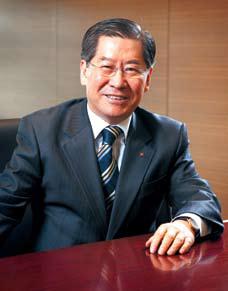 9 (9) Kwon Oh-nam
9 (9) Kwon Oh-nam
President and Chief Executive
Grand Korea Leisure
Kwon Oh-nam’s appointment as President and Chief Executive of Grand Korea Leisure (GKL) in 2008 was followed in 2009 by a 67.6% rise in net profits at the state-owned casino operator. It must have been down at least in part to good management as well as natural expansion, given that the rise in performance coincided with a global financial crisis.
GKL opened the first of its three properties under the Seven Luck brand— Seven Luck-Seoul Gangnam, in January 2006. That was followed by Seven Luck- Millennium Seoul Hilton in May that year, and Seven Luck-Busan Lotte in June.
Net profit in 2006 was KRW3.5 billion (US$3 million) on gross revenues of KRW125.2 billion. But as GKL added more capacity and gained more experience in the industry, by the end of 2009, net profit had soared to KRW101 billion (US$85.6 million) on gross revenues of KRW481.2 billion.
That bounce helped to stimulate significant interest from private investors when GKL floated 30% of its stock on the Seoul bourse in November last year. The challenge now is to maintain profitability as the business matures and develops its product range. GKL’s three properties are only open to foreigners or Koreans holding foreign passports. Developing the business principally means finding new ways to encourage existing and new Japanese and Chinese players to visit and spend their money.
The task is a tough one. GKL’s operating profit for the second quarter of 2010, announced in August, was KRW8 billion (US$6.8 million) a 62.2% fall from the KRW21.6 billion reported a year earlier. The result was 57.5% below some analysts’ forecasts, according to a report by Hyundai Securities. The dip was attributed by analysts to a number of factors, including a rise in overheads linked to an increase in the number of Chinese high rollers. The number of Chinese visitors at GKL’s venues increased by 72.9% quarter on quarter.
Received wisdom in the industry is that South Korea is not directly competing with Macau, but serving a distinct market made up mainly of Japanese and northern Chinese. Macau is serving mainly southern Chinese customers. But as more and ever smarter casino properties open in Macau and Singapore, there is pressure on regional gaming centres such as South Korea to keep pace in terms of the style and quality of facilities. Looming (if somewhat distantly) on the horizon is also a major competitive challenge from Japan should that country ever get around to legalising casino gaming.
GKL has been spending a considerable amount on refreshing its product offer, although its casinos are no more than four years old. Seven Luck Millennium Seoul Hilton underwent a five-month, KRW6 billion won (US$5 million) renovation between May and the end of August.
Six new gaming tables and 51 seats were added to the existing 59 tables in an effort to attract and retain VIP patrons. In addition, the overall space of the casino was increased by 1,442 square feet, and 25 LCD flat screen monitors were installed along with crystal chandeliers.
In early October last year, GKL opened a dramatically revamped third floor VIP area at its Seven Luck property at Gangnam in the capital Seoul. The company said it spent KRW8.3 billion (US$7.1 million) on the refitting. The new zone has five VIP rooms plus 19 gaming tables in an open hall area, taking the property’s total inventory at that time to 74 tables and 112 slot machines. GKL also brought in 71 new dealers to the property—all trained at its Seven Luck Casino Academy.
If South Korea is to face the long term competitive challenge from neighbouring casino jurisdictions, then opening the industry to locals rather than simply revamping foreigners-only venues is probably the answer. The 64-year-old Mr Kwon is well placed to act as a public relations face for the industry in any lobbying campaign. He has impeccable contacts within South Korea’s government from his days at the Korea Trade Investment Promotion Agency (KOTRA). He held a variety of positions there, including heading the agency’s North American office.
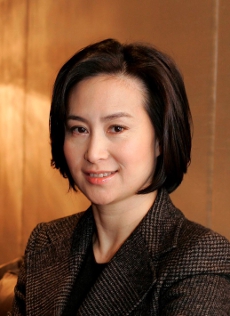 10 (11) Pansy Ho
10 (11) Pansy Ho
Managing Director
MGM Grand Leisure
Managing Director
Shun Tak Holdings
At a recent social event in Macau, Pansy Ho was treated rather like royalty. This could be simply the usual politeness of local people toward the great and the good. A cynic might think it was locals hedging their bets in case Ms Ho is soon to inherit her father Dr Stanley Ho’s business interests.
Ms Ho might as well enjoy the red carpet treatment at home, because she’s unlikely to see much of it abroad. Her Macau joint venture partners MGM Resorts gave up their interest in an Atlantic City casino earlier this year on her and Macau’s account. That was after the New Jersey Division of Gaming Enforcement’s (NJDGE) famously peevish report last year describing Ms Ho as an unsuitable partner for the US casino operator. The main charges were that she is Stanley Ho’s daughter and that Dr Ho has ties to organised crime groups; ergo, through her father, she is connected to organised crime. If that sounds more like the logic of the Salem Witch Trials than modern legal process, MGM wasn’t dismayed. MGM’s decision to stick by Ms Ho and ditch New Jersey wasn’t difficult, given that Atlantic City’s revenues had been going into reverse while Macau’s had been growing 40% or more year on year.
With that particular distraction behind her, Ms Ho has been able to concentrate more on building up MGM Macau’s business. A milestone in that process was passed in December last year when One Central, the luxury residential and retail development by Hongkong Land and Ms Ho’s own conglomerate Shun Tak, opened its doors. One Central is connected directly to MGM Macau, and has some of the smartest shops ever seen in Macau, including a multi-floor Louis Vuitton store that ranks among the world’s largest. It’s just the kind of amenity that MGM Macau needs if it is to kick on from its respectable if unspectacular start and become a second home for Chinese high roller players and their families.
Ms Ho may dispute the findings of New Jersey’s gaming enforcement people that she is too closely tied to her father. But the Ho family name can’t have done too much harm, and may even have done some good when it came to drumming up more high roller business for MGM Macau. Ms Ho’s influence can be detected in the recent move to ramp up the involvement of traditional Macau junkets at the property. That local market ‘in’, combined with MGM’s acknowledged sophistication in player tracking and player rewards, could prove a winning combination over the course of the next 12 months.

























